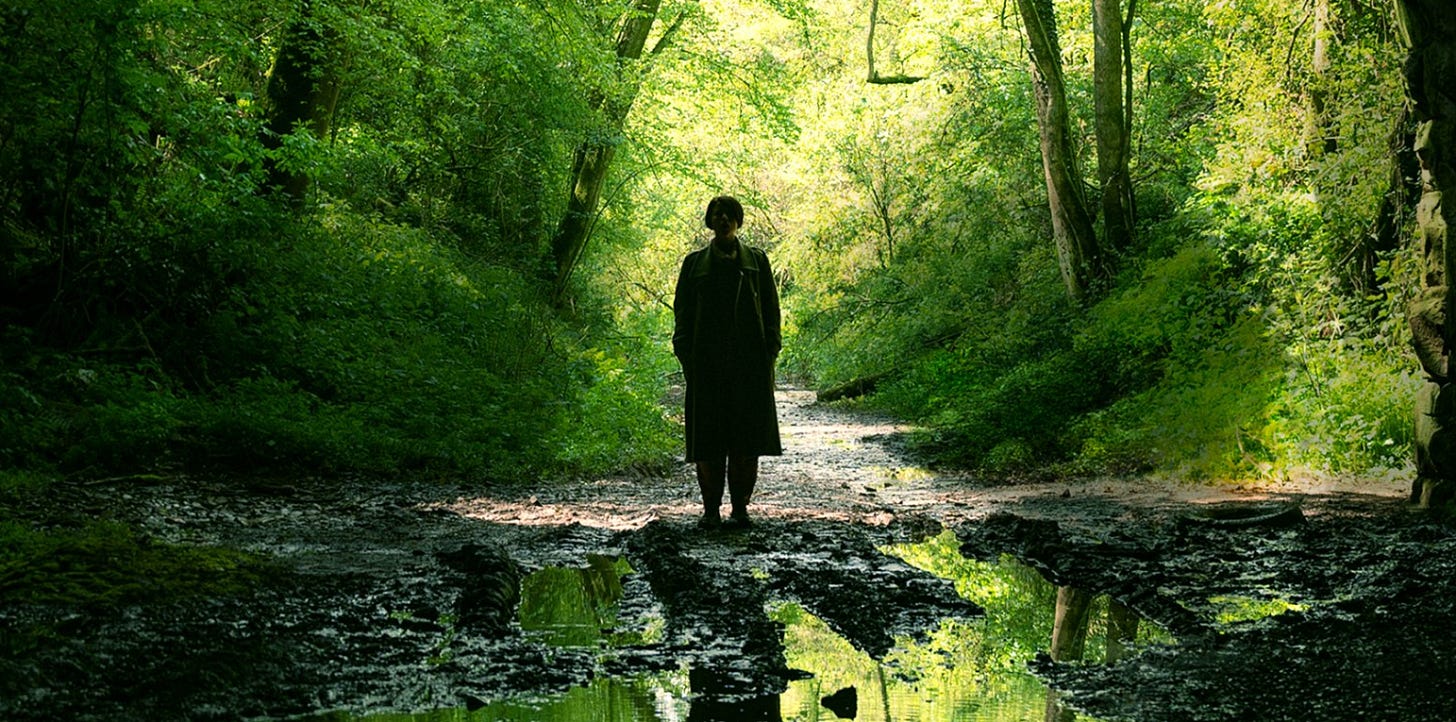- Enya's Newsletter
- Posts
- I Actually Like Men (dir. Alex Garland)
I Actually Like Men (dir. Alex Garland)
A film that ignores conventions....or is boring. Depends on who you ask.

Originally from February 8th 2023
I came up with this title before even watching the movie because I thought it was funny. It’s a film I’ve been meaning to see since its release but after a swam of negative reviews, including from Jeff Vandermeer (writer of Annihilation which was then adapted into a film of the same name by Garland), hearing it was pretentious and just not very good, I was dissuaded for awhile. But then I remembered I’m also pretentious and if anything I love an attempt. It was a particularly windy day in Brooklyn when I decided to watch this, afraid the windows were going to burst at any moment which helped with the overall unsettling vibe of the film.
The films opens with Lesley Duncan’s ‘Love Song’ (and ends with Elton John’s version). A man is falling past a window then cut to dandelion seeds being blown away. My immediate thought was “I get it”. Perhaps this is where the issues with Men stem from. The metaphor is too on the nose. But I don’t know if that’s true because I’ve seen people online say it was confusing and didn’t make sense. Maybe it’s an art school degree that gives me some kind of knowledge about how symbolism works but the film isn’t exactly hiding anything. The main character, Harper, literally bites into an apple in the first five minutes. I would like to give Garland the credit that this is intentional given his previous work. It’s a weird film, some of the visuals are a bit clunky at times but it’s mostly creepy and wonderfully grotesque.
enyano’s Substack is a reader-supported publication. To receive new posts and support my work, consider becoming a free or paid subscriber.
What interested me most was the idea of finding comfort in nature. It’s something we’re seeing more and more in our day to day, articles about the benefits of nature, how urbanisation is taking away something fundamental within humans, the benefits of hiking for mental health, etc. Garland makes green into something sinister. A kind of rejection of “the good old days”, the good old days being when we were “one” with nature. The green man represents this rejection of romanticising nature as a caring, nurturing thing. It doesn’t argue that we’re better off now, but he doesn’t want us to think that nature is kind either. But this muddies the meaning of the film a bit. Is the argument that men and nature are the same? That women are doomed to be victims of nature and men? I don’t think that is the case.
Near the end of the film the vicar says “This is the control you exert” after telling Harper about all the things he imagined her doing, as if she’d done them. He is projecting onto her his sexual fantasies. He knows nothing about her, we as an audience know that too. But it doesn’t matter, he is convinced she has done this to him, as if intentionally. He projects onto her like we project safety onto nature. Nature did nothing to us, in fact, this projection shows how little we know about it. It reminded me of ‘Fear of Cold’, a video essay by Jacob Geller I’ll link at the end which I think encapsulates my point.
The vicar also quotes Leda and the Swan by William Butler Yeats:
A shudder in the loins engenders there
The broken wall, the burning roof and tower
And Agamemnon dead.
I’m not here to interpret the use of the poem, it just made me think about Agamemnon. A man who went to war to take back his brother’s wife, sacrificing one of his daughters in the process and then to return home to be murdered by his wife, Clytemnestra (who was the daughter of Leda), and her lover then later the obsession of his daughter Electra. I began thinking of the film as a Greek tragedy, the morals not clear cut but dictated by bored Gods. It does feel like, upon reflection, that Harper is being toyed with. The plot sounds a bit like something Euripides would come up with: a suicide, a woman disrupting a sleeping god, hounded by townsfolk and disbelieved, only to witness the horror alone. People wanted this film to be a horror when it is in fact a tragedy. The only resolve is that it is over.
I have quite liked all of Garland’s work (Ex Machina, Annihilation and Men) because none give easy answers. Also the man loves some body horror and Men is no exception. I also would recommend another video essay that’s about the film called ‘Men: Rhyme Over Reason’ by Acolytes of Horror (link below) if this short essay makes you more interested in the interpretations of Men.
If you haven’t seen Men I would ask you to give it a chance, if only for the fact that it’s a strange little film.

Thank you for reading.
-Enya xx
Video essays mentioned: